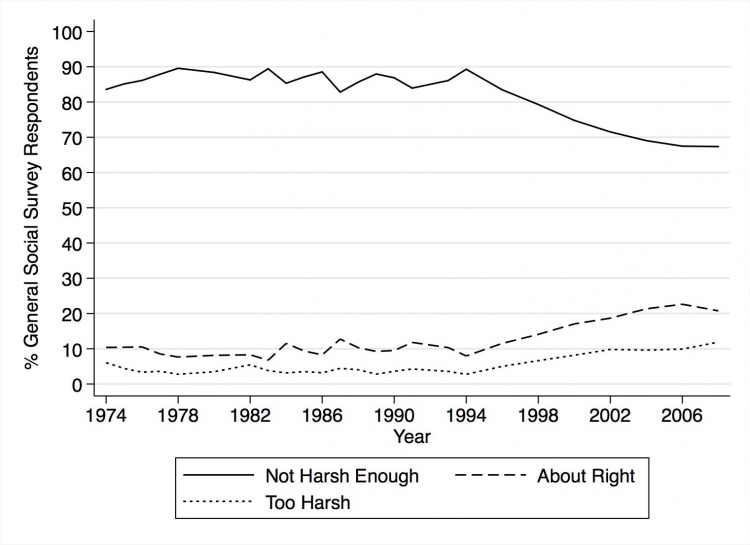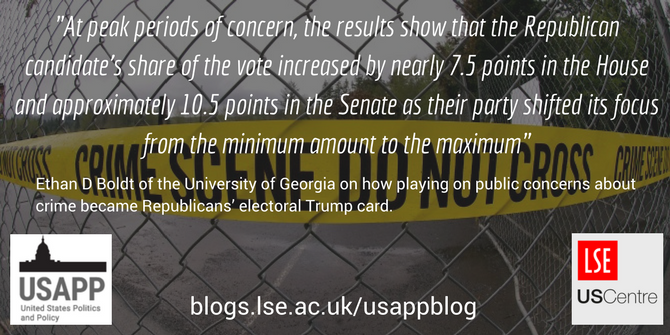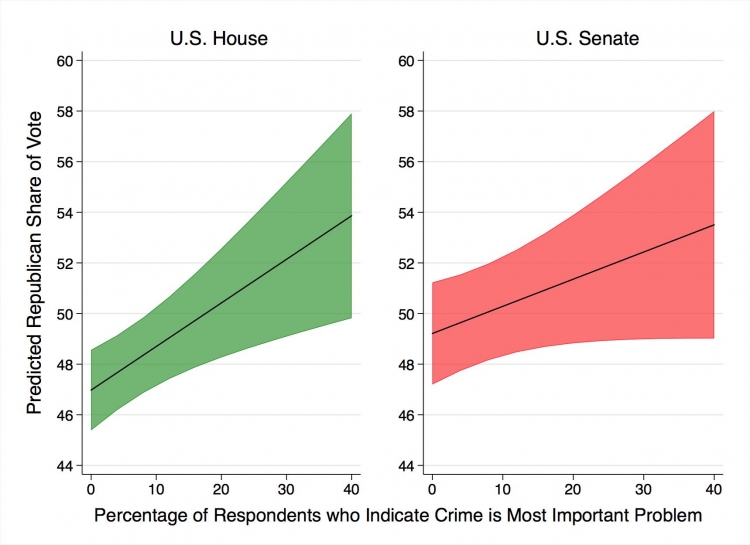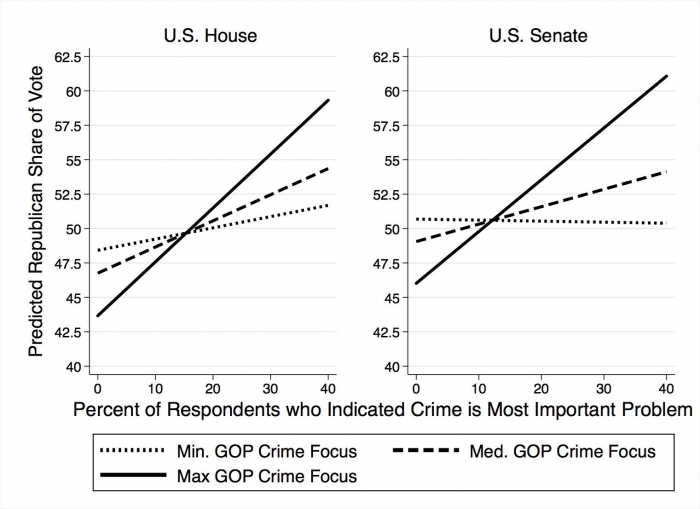Journalists, scholar s, and other observers of politics have claimed for decades that the Republican Party has focused on crime as an electoral issue. In new research, Ethan D. Boldt finds that Republican congressional candidates have, in fact, shared a special relationship with the public on the issue of crime, electorally benefiting from its significance and by the party focusing on it when it has mattered most to voters.
s, and other observers of politics have claimed for decades that the Republican Party has focused on crime as an electoral issue. In new research, Ethan D. Boldt finds that Republican congressional candidates have, in fact, shared a special relationship with the public on the issue of crime, electorally benefiting from its significance and by the party focusing on it when it has mattered most to voters.
During the 2014 midterm elections, the incumbent Republican congressman for the Second District of Nebraska, Lee Terry, faced a strong challenge from his Democratic opponent, Brad Ashford. In response, the National Republican Congressional Committee (NRCC) and Terry aired local television advertisements attacking Ashford for his prior support of the state’s “good time law,” which allows prison inmates to be released early if they maintain good conduct while incarcerated. The NRCC’s advertisement in particular stirred controversy, since it attempted to tie Ashford’s support for the law to a gruesome quadruple homicide committed by Nikko Jenkins, a convicted armed robber who was released early from prison under the statute. The Republican ad campaign portrayed Ashford as soft on crime and incapable of protecting his constituents. In spite of this provocative effort, Ashford defeated Terry.
The use of crime as a political issue in this way is not novel. In fact, the media immediately drew comparisons between the NRCC’s advertisement about Nikko Jenkins and the infamous “Willie Horton” television advertisement attacking Democratic presidential candidate Michael Dukakis during the 1988 presidential election. Journalists, scholars, and other observers of politics have claimed for decades that there is a pattern of Republican candidates relying on crime as a key electoral issue. Indeed, the 2016 presidential campaign saw the return of this brand of Republican “law and order” politics where Donald Trump prominently claimed that he would end the, “crime and violence that today afflicts our nation” during the opening lines of his speech accepting the Republican nomination.
Why have Republican candidates returned to this electoral strategy time and time again? Have Republicans been at an advantage when crime was a major concern of voters? Have Republicans’ strategic appeals to the public on the issue further driven voters to them? To study these important questions, I assess the influence of crime as an electoral issue on contested races for the US House of Representatives and US Senate from 1974 to 2008. I find that Republican congressional candidates have shared a special relationship with the public on the issue of crime, electorally benefiting from its significance and by their party focusing on it when it has mattered most to voters.
Why might Republican Party candidates benefit from “law and order” politics?
Historically, the public has held largely unified opinions about how America should treat its criminals. This can be seen in data from the General Social Survey, which has contained a question asking the public their opinions on how courts handle those convicted of crimes in their area. It asks respondents, “In general, do you think the courts in this area deal too harshly or not harshly enough with criminals?” Figure 1 displays the percentage of respondents who stated an opinion from 1974 to 2008 by category of response.
Figure 1- Public Opinion on Judicial System’s Treatment of Criminals

A large majority of those surveyed felt that courts do not treat criminals harshly enough. Though there is substantial evidence that the public’s views on criminal justice are now shifting, over the past half-century the public has had a broad inclination toward punishment.
The theme of the Republican electoral strategy on crime has largely been to pursue a “get tough” approach and to rebrand their Democratic opponents as being unable to address the underlying problems. This position taking has placed Republicans firmly on the side of harsh punishment, aligning themselves with the public’s views and tapping into their punitive preferences. For political scientists, this has translated into the notion of Republican issue ownership of crime, meaning that the public tends to prefer their approach to tackling the policy issue, that Republican candidates should emphasize it when campaigning, and that they should see electoral gains when it is on the minds of voters.

“Crime Scene Do Not Cross” by Curtis Perry is licensed under CC BY NC SA 2.0
Do congressional Republicans gain at the polls when crime is an important issue to voters?
I examine the role of public concern about crime on the vote margins of contested congressional elections. Specifically, I use the percentage of Gallup respondents over time who identify crime as the “most important problem facing the country today” to capture its importance to voters. If the conventional wisdom is correct, Republican candidates should see increases in their share of the vote when crime is on the minds of constituents.
Controlling for a wide array of factors known to influence electoral outcomes, I find this effect across both chambers’ races. Figure 2 displays the predicted impact of public crime concern on the Republican share of the vote.
Figure 2 – Impact of Public Crime Concern on GOP Congressional Candidates’ Vote Share

Relative to when crime has been of the lowest importance to voters, the results show Republican candidates have received an electoral gain of roughly 4 to 6 points over their Democratic opponents when perceptions of crime are most serious. Given that crime must compete with numerous influences upon electoral outcomes, this is a substantively meaningful effect. Interestingly, measures of crime’s actual prevalence (captured through crime rates) had no significant effect on vote share. This suggests that the electoral influence of crime is more a matter of perception than reality and aligns closely with recent polling indicating that 70 percent of Americans feel crime is rising despite being in a period of low crime rates.
Have Republican Party appeals on crime had any impact on electoral outcomes?
Finally, I examine the role of GOP campaign strategy on crime in electoral outcomes. I test for the combined effect of the party’s focus on crime and the importance of crime to the American public. I use the amount of emphasis the Republican Party places on crime in its most recent platform as a proxy for the party’s messaging on the issue. If the notion of issue ownership is correct, the Republican Party likely increased its electoral dominance on crime by emphasizing it during periods of high public concern. Indeed, I find results that suggest the effectiveness of this strategic emphasis. Figure 3 displays the joint impact of the GOP’s focus on crime and the public’s concern about it on Republican candidates vote shares.
Figure 3 – Combined Effect of Public Crime Concern and GOP Crime Emphasis on GOP Candidates’ Vote Share

We can see that the Republican Party has increased its electoral advantage on crime by choosing to focus on it when it matters most to voters. At peak periods of concern, the results show that the Republican candidate’s share of the vote increased by nearly 7.5 points in the House and approximately 10.5 points in the Senate as their party shifted its focus from the minimum amount to the maximum. Conversely, Republican candidates received the lowest relative share of the vote when, as a party, they overemphasize crime relative to the public’s minimal concern. Interestingly, both too much and too little attention to the issue of crime relative to the preferences of the public had tangible electoral costs.
Crime will continue to be a political issue
The existence of electoral incentives to take punitive stances on crime may have had (and may continue to have) a profound impact on the state of criminal justice policy in America. My work connects naturally with Peter Enns’ fascinating research, which argues that public opinion on punishment has, in fact, been the driving force behind mass incarceration.
Admittedly, the applicability of my results to future election cycles is uncertain. Public opinion on crime and policy positions on the issue seems to be undergoing historic upheavals. For instance, while there were some indications that the Republican stance on crime was changing, such as Texas Senator Ted Cruz’s support for criminal justice reform, that movement appears to have been largely muted by the aggressive positions of the Trump presidency. Regardless, the political issue of crime will continue to be of both practical and symbolic importance in America.
- This article is based on the paper ‘Taking a Bite Out of the Crime Issue: Congressional Candidates and Partisan Benefits’, in Criminal Justice Policy Review.
Please read our comments policy before commenting.
Note: This article gives the views of the author, and not the position of USAPP – American Politics and Policy, nor of the London School of Economics.
Shortened URL for this post: http://bit.ly/2hmN7D9
_________________________________
About the author
 Ethan D. Boldt– University of Georgia
Ethan D. Boldt– University of Georgia
Ethan Boldt is a Ph.D. Candidate and Presidential Fellow in the Department of Political Science at the University of Georgia. His primary research interests are in judicial behavior, American trial courts, and the implementation of court decisions. His dissertation examines the influence of prosecutors, defense attorneys, and judges on federal criminal cases.




